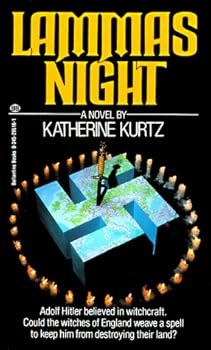
 Lammas Night by Katherine Kurtz
Lammas Night by Katherine Kurtz
Within neo-pagan circles, there is a persistent legend that numerous British witches and occultists banded together during World War II, using magic to keep Hitler from invading Britain. I’m not convinced there was a huge organized effort, but I’m sure there were occultists in Britain at the time, and it would surprise me more if no one had tried to lay the magical smack down on the Führer. Katharine Kurtz uses this legend as the basis for Lammas Night.
This historical fantasy centers on John “Gray” Graham, an intelligence officer who is also a member of a witch coven. The other major characters are people close to Gray, such as his son, who is currently in uniform; his High Priest and Priestess; and his best friend, Prince William, a (fictional) younger son of the royal family. Through their mystical arts, Gray and his coven learn of Hitler’s plans to stage a massive attack on Britain. They now must persuade a number of other covens to help them in their attempt to repel the attack.
At the same time, Gray is having troubling visions of his past lives. Kurtz draws on the lore of the sacred/sacrificial king, especially that posited by Margaret Murray, in creating Gray’s history. Throughout the centuries, Gray has sometimes been the killer of the king, and sometimes he himself has died as a substitute. Gray begins to wonder if another terrible sacrifice is needed in this perilous time.
Lammas Night is an enjoyable novel, though it’s very “talky” and a little dry in places. The characters sometimes seem too good to be true, not in a superpowered “Mary Sue/Gary Stu” sort of way, but in their almost saintlike devotion to duty. Somewhere between their military training, their faith, and the times they lived in, these characters make personal sacrifices that many of us would be unwilling, or at least hesitant, to make. Indeed, the entire plot hinges on this trait. Perhaps the characters are best seen as analogues of the Knights of the Round Table, and I mean the idealized, virtuous versions of said knights. (In fact, there’s even an Arthur/Guinevere/Lancelot triangle of sorts, but Kurtz’s “Lancelot” sticks to loving his lady from afar.) They do heroic deeds, but it’s not always easy to relate to them.
What Kurtz does best in Lammas Night is weave the magical elements perfectly into the real history. The reader is left with the impression that this could have been going on behind the scenes. I recommend Lammas Night to readers looking for an unusual historical fantasy with subtle magic, with the caveat that the cover makes it a little uncomfortable to read in public. Sure, there’s a knife through that swastika, but the swastika is so much more visible…



Agree! And a perfect ending, too.
I may be embarrassing myself by repeating something I already posted here, but Thomas Pynchon has a new novel scheduled…
[…] Tales (Fantasy Literature): John Martin Leahy was born in Washington State in 1886 and, during his five-year career as…
so you're saying I should read it? :)
As a native New Yorker, I love the idea of the city being filled with canals and no skyscrapers! And…